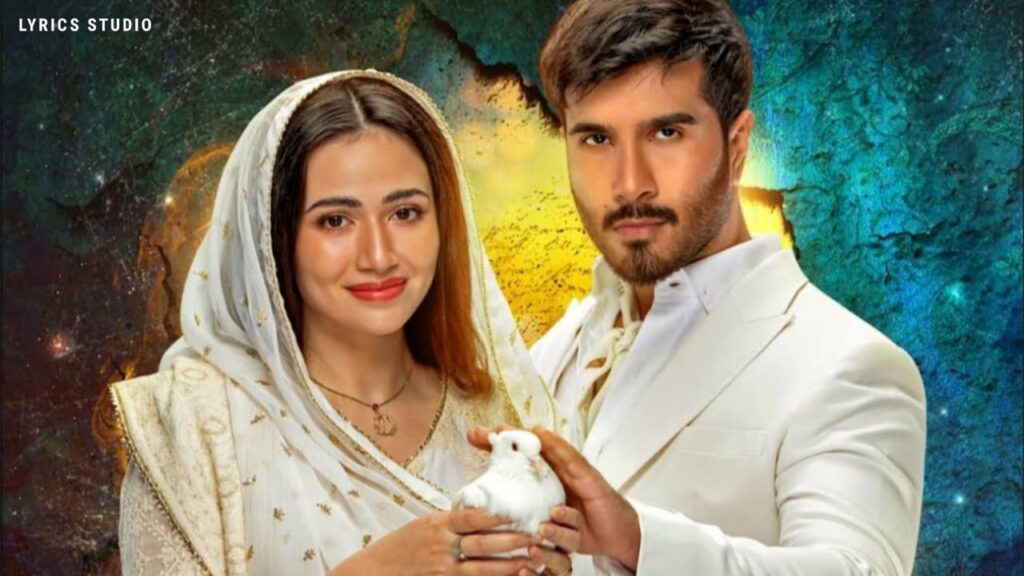“Aye Musht E Khaak” has been a discussion point since the moment it began, whether it’s on the subject itself or Feroze Khan’s flamboyant portrayal of Bobby. Starring Feroze Khan, Sana Javed, Asad Siddiqui, Iffat Omer, Shahood Alvi, Danial Afzal and others in important roles, the story has been written by Maha Malik and directed by Aehsun Talish. In current episodes, we have seen Duaa and Mustajab’s marriage coming to an end as Duaa refuses to entertain Mustajab’s deceit, lies and complete disbelief in God.
It is quite a bold step for the team of “Aye Musht E Khaak” to openly acknowledge atheism in a drama where, culturally, atheism is seen with such a strict eye. Still, we are aware that atheists do exist within Pakistan and losing a link to religion isn’t as difficult as one may believe. However, there could have been a better way of discussing the situation rather than the (as always) over-the-top courtroom scenes where Duaa (Sana Javed) has applied for a “khulla” (divorce). The lawyers are all arguing over the “basis” for divorce and one has to roll their eyes at the audacity of it – the basis is that she wants a divorce and doesn’t want to be married to Mustajab (Feroze Khan). Isn’t that enough?
Iffat Omer shines in this episode as Shakeela struggles between her motherhood and “duty” towards her son on one side while her religion on the other. Shakeela may have raised Mustajab with poor values and concept of religion, but she herself does hold religion in high regard – and her reason for marrying Duaa and Mustajab was in the hopes that Duaa would “fix” Mustajab. This isn’t an unrealistic situation, as many women in South Asian society have found wives for their sons on this basis, with the hope that their sons will settle down or calm down. And yet, Shakeela has gone the extra mile for her son, protecting his image and fighting for his love, but she visibly cannot cross this line when it comes to swearing lies upon the Quran. Iffat Omer has portrayed this confusion within her character well.
Of course, Feroze Khan’s performance continues to be a strong one as Mustajab unravels, getting drunk at parties and hanging around with his once-ex again. Ironically this “bad girl” ex of his is humorously dressed from head to toe in a very decent outfit, only “bad” because she isn’t wearing a dupatta on her head? Mustajab seems to be taking a potentially dangerous turn, unwilling to let Duaa go and openly telling his mother that he won’t leave her alone so easily. Mustajab doesn’t know what love is, but he truly does believe he loves Duaa – and he won’t let that love slip away.
Tabeen (Namra Shahid) is a sweet character, a young girl who has fit nicely into the family, accepting Dayaan’s (Asad Siddiqui) parents and sister as her own. It’s heartwarming to see a sister-in-law void of scheming, plotting and hateful taunts. And yet, we are trained to expect this from “bhabi” roles, so one almost finds themselves waiting for the ball to drop and Tabeen’s “true emotions” to be revealed. So far, it appears as though she will remain a positive character, but again, it’s difficult to accept that so early on. Tabeen and Dayaan make a sweet on-screen pair and lighten the otherwise heavy mood a bit with their scenes together. How long before Tabeen begins to think about Duaa for her own brother? We can already sense the story headed in this direction.
Overall, “Aye Musht E Khaak” continues to be a good show, but it has taken a turn for the “preachy.” Duaa has not, at any point, tried to change Mustajab. She has not tried to tackle the situation with understanding or kindness. And while it’s refreshing to see a female lead who knows what she wants, she is also a very judgmental character and it’s not the greatest to see a “religious” character in this light, sending out a less-than-ideal message. Of course, it’s not clear how the story will unwind moving forward, but the team has certainly done a good job keeping audiences interested.

